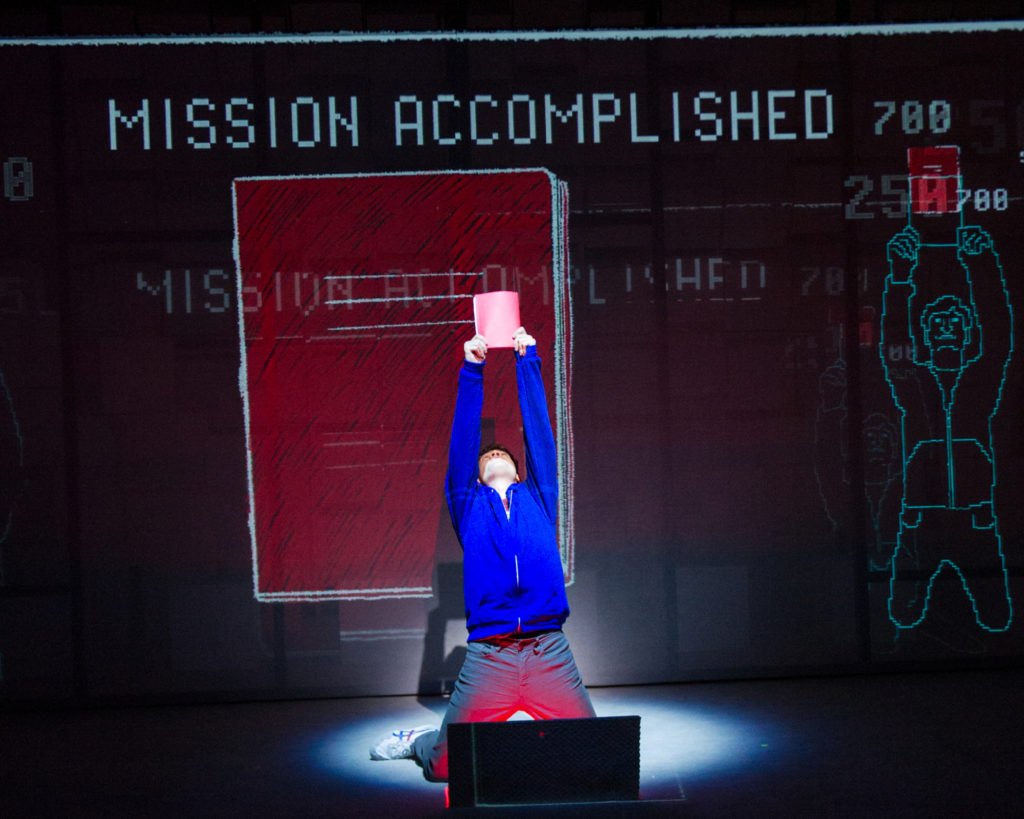Culture
 Harrison Bryan as Christopher // Photo: C. Stanley Photography
Harrison Bryan as Christopher // Photo: C. Stanley Photography
Round House Theatre’s “The Curious Incident of the Dog In The Night-Time” Highlights Neurodiversity
December 16, 2019 @ 12:00am
The expression is “walk a mile in someone’s shoes,” but wouldn’t it be easier to just to take a peek inside of their mind? That’s what Round House Theatre seeks in their production of The Curious Incident of the Dog in the Night-Time. Based on the best selling book of the same name, the play allows audiences to see inside the mind of Christopher Boone. This coming of age story about a 15-year-old boy on the autism spectrum comes to life with stunning visuals and graphics.
Christopher is extremely smart and enjoys math (or maths as they say in England, where the play takes place,) video games, his pet rat Toby and being a detective. He doesn’t like figures of speech, being touched or strangers. When accused of killing his next-door neighbor’s dog, his curious nature comes in handy. Despite his father telling him to stop snooping, Christopher discovers that this case is much bigger than he thought.
Christopher’s story is not one that’s often portrayed on stage. Representing the neurodiverse community was not a responsibility that Ryan Rilette took lightly. As Round House Theatre’s artistic director and co-director of the play, he wanted to portray Christopher as an accurate depiction of a person on the spectrum but also show that Christopher’s story is only one of many.
“As we started to work on it, and with every play that we do, we try to figure out what is the community surrounding that play?” he says. “What is the right audience for the play? And more importantly, who do we need in the rehearsal room to help us tell the story? In this case, it was very important to us to make sure we had teens, as well as adults on the spectrum who could give us their feedback on the play.”
“Throughout the whole building, one of the things you’ll see is that we’ve said over and over again the phrase ‘If you’ve met one person on the spectrum, you’ve met one person on the spectrum.’ So, we have art by other people on the spectrum that is upstairs, as part of a partnership with Visarts, and clings in the windows downstairs.”
Round House’s production of the play is unique from the Broadway or West End shows in the way that media is used. While known for its projections and high sensory lights, videos and sounds, Rilette and co-director Jared Mezzocchi didn’t want to overwhelm the audience as the original production attempted to do.
Christopher is highly sensitive to touch and sounds. To address Christopher’s sensory processing disorder, something all people on the spectrum suffer from, Rilette used red scribbles or what he calls “billows” projected on the stage to visualize what it would look like if Christopher were to be yelled at or touched.
The characters love of computer games is also used to visualize aspects of the script. At one point the giant clear screen, serving as the background for most of the projections, becomes a game of “Tetris.” A scene where Christopher is recounting his day could be seen as mundane but is transformed into a hilarious monologue in which Christopher is a Mario-like video game character.
“We started to go, well he’s also a gamer. There’s a scene where he’s playing ‘Tetris’ and talks about computer games and his dad says ‘you like those.’ So we thought, given that he’s a computer gamer, what if we used first-person video games as a way to show some of these ideas. What if it’s just like he’s in his own video game inside his head, which can also help with the way in which the play jumps around in time.”
Under the direction of Rilette and Mezzocchi, actor Harrison Bryan adapted the way in which he portrayed Christopher. He focused more on who the character is as a person. Playing Christopher the second time around at the regional level, Bryan’s portrayal was humorous, passionate and showed the many multitudes of Christopher’s personality.
The Curious Incident may not be typically thought of as a holiday show. There is no Santa or Christmas magic. However, the play’s ability to create empathy for its characters and appeal to audience members of all ages and abilities makes it a must-see show this season. Not only does it inspire the encouragement of others but also belief in your own abilities. At the end of his journey, Christopher asks: “Does that mean I can do anything?”
“Some people who are neurotypical, who have not dealt with neurodiverse people before, can look at them like they’re damaged. They see the disability and not the ability. I feel like the beautiful thing about what we’ve done is we’ve shown how incredibly creative and rich Christopher’s inner life is.” Rilette says. “So, I would hope that [ the audience] would go away and look at other people who are not neurotypical like they are and see them in a different way. I hope neurodiverse audiences come in and can enjoy the show and say “That’s not exactly me because everyone is different, but I believe that this is a neurodiverse person. This is an interesting person that I see parts of myself in.”
The Curious Incident of the Dog in the Night-Time runs until December 22. For tickets or more information, visit here.
Round House Theatre: 4545 East-West Hwy. Bethesda, MD; 240.644.1100; www.roundhousetheatre.org







